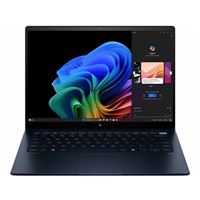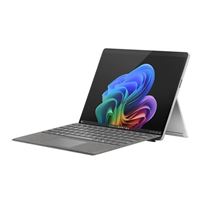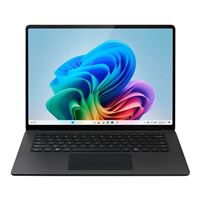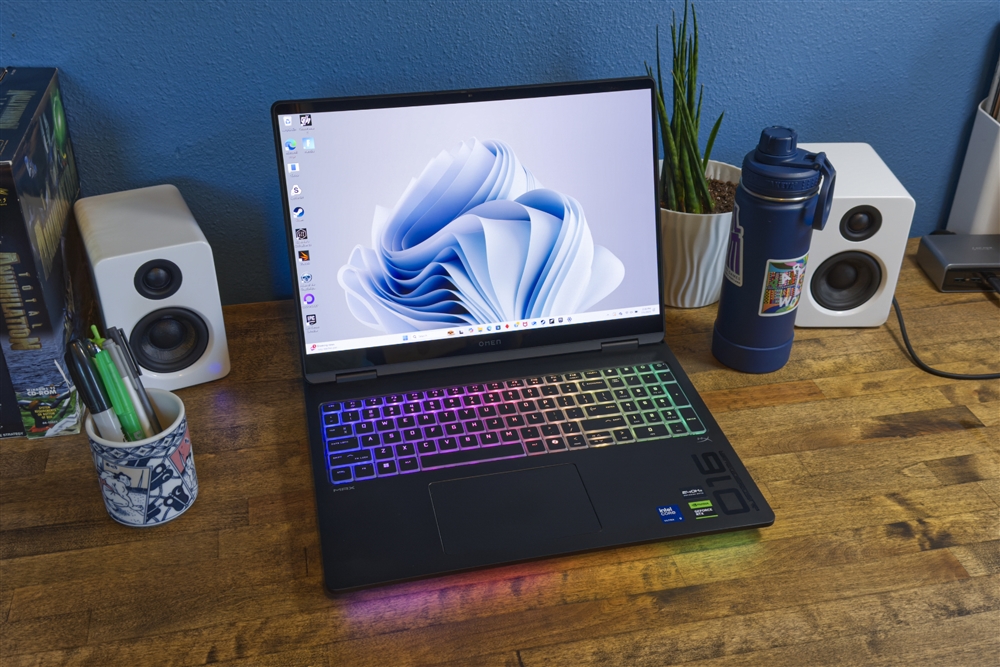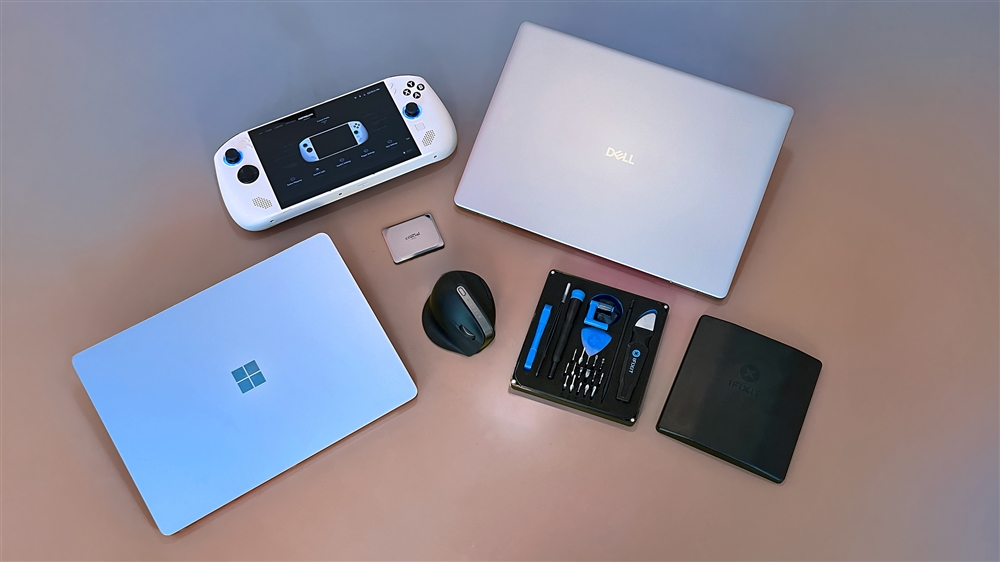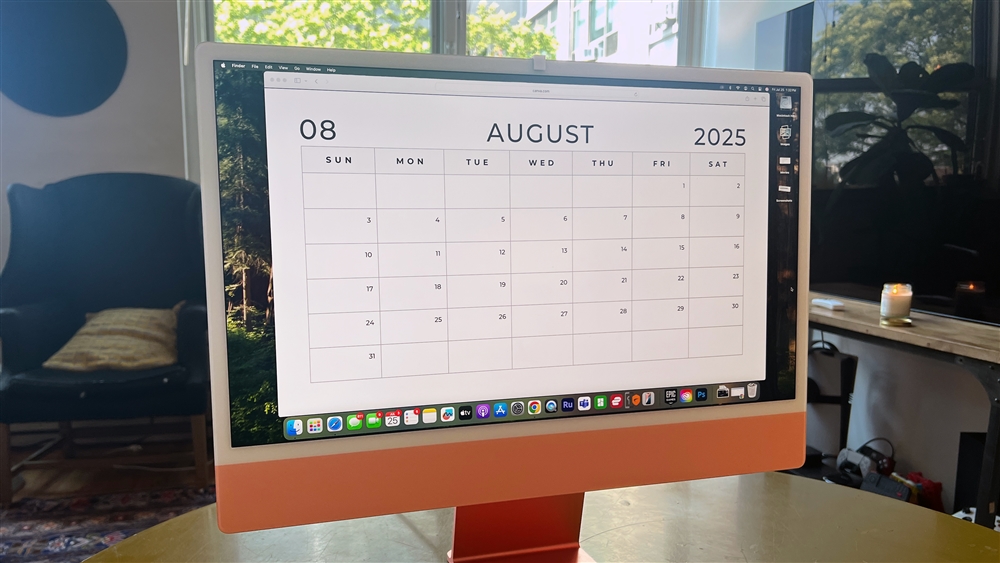HP EliteBook Ultra G1q Review
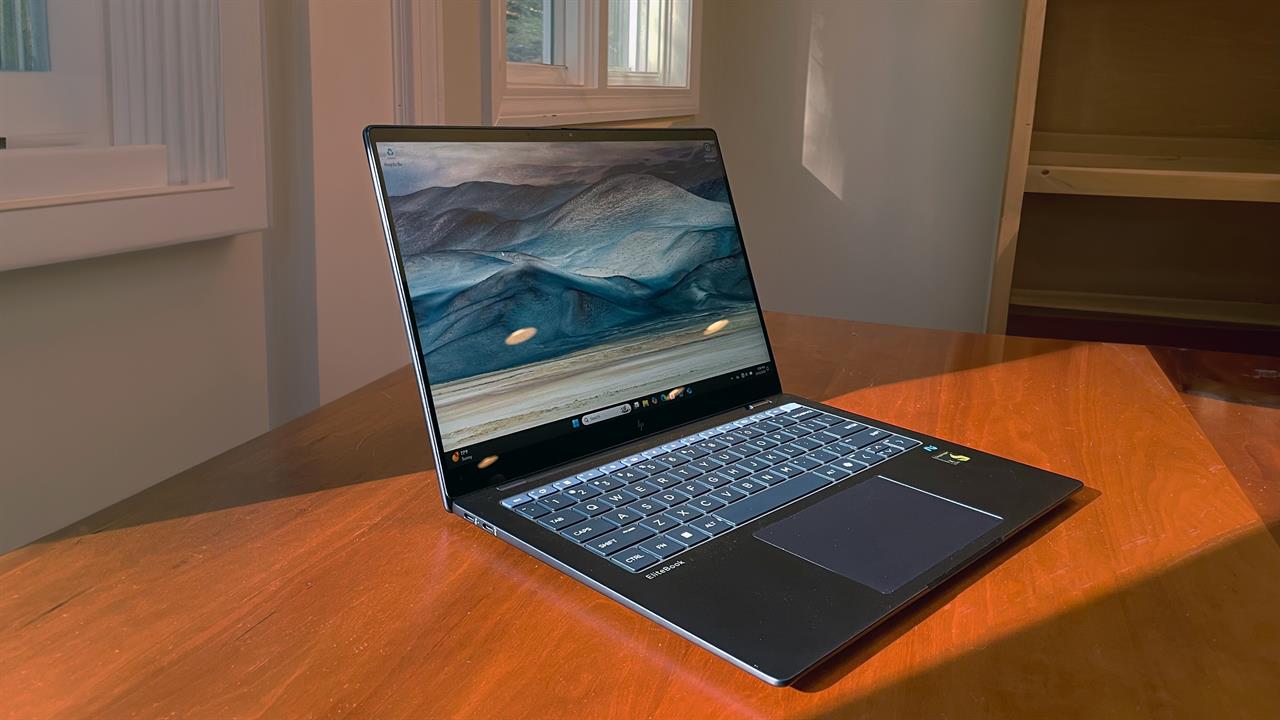 Photo: Rich Brown
Photo: Rich Brown
HP’s new EliteBook Ultra G1q laptop targets executives and self-employed professionals who have fully embraced the AI-enhanced reality of contemporary worklife. A member of Microsoft’s Qualcomm-powered Copilot Plus computing ecosystem, this laptop was designed to work with the onboard AI baked into Windows 11 Pro, but HP has also added its own AI tools to enhance its offering. A premium business laptop through-and-through, the $1,399 EliteBook Ultra G1q will satisfy anyone looking for an eminently portable computer to use for anything from focused productivity to creative work to the occasional gaming session.
Microsoft’s Copilot Plus initiative outlines a range of components for qualifying PCs, and the 12-core Snapdragon X Elite CPU and 512GB solid state hard drive put this EliteBook on the higher-end of that spectrum. The 14-inch IPS touchscreen is crisp and bright, and while it doesn’t have the same 120Hz refresh rate experience as Microsoft’s own Copilot Plus Surface laptop, its 2,240x1,400 screen gives you a sufficiently expansive workspace in a familiar 16:10 aspect ratio.
Basic specs aside, the draw of the Copilot Plus program, especially for IT managers and anyone hoping to use this laptop in a corporate environment, is that it has its own NPU, in addition to a CPU, for handling some AI processing locally rather than farming it out to an external cloud network. Local AI is becoming more important from the standpoint of protecting potentially sensitive information.
Microsoft has its own AI features that come native to Windows 11 Pro, including an art assistant for Paint called Cocreator and a feature called Live Captions that can add real time captions and even translate dialogue from any video source into 44 different languages. Those features are clever, but they’re also universal to Copilot Plus PCs, and thus not very distinguishing for this HP.
To help this EliteBook stand out, HP has added two AI tools of its own that promise some real utility. The Poly Cam Pro app is the most immediately useful. It gives you a set of webcam control settings that apply universal camera effects across all your video chat software. It’s a convenient way to ensure that the amount of image blurring, camera focus and other effects remains consistent regardless of which virtual meeting software you use throughout the day.

Screenshot: Rich Brown
Poly Cam Pro works with the native 5MP webcam built into the laptop, and it can also apply its effects seamlessly to an external webcam if you’d rather bring your own. One thoughtful extra in the app is a watermark feature with templates that let you add your name and contact information onscreen to any video call.
HP’s AI Companion is the other tool. It’s still in Beta, so you’ll need to forgive a few quirks, but you imagine it delivering some real benefits in a business setting. AI Companion has three core features, Discover, Analyze, and Perform. Discover is essentially like any other open-ended AI assistant with a built-in knowledge base, but it doesn’t pull in that information from over the internet in real time. Ask it “When do the Yankees play next?” and the AI Companion will tell you you can look that information up at MLB.com and elsewhere.
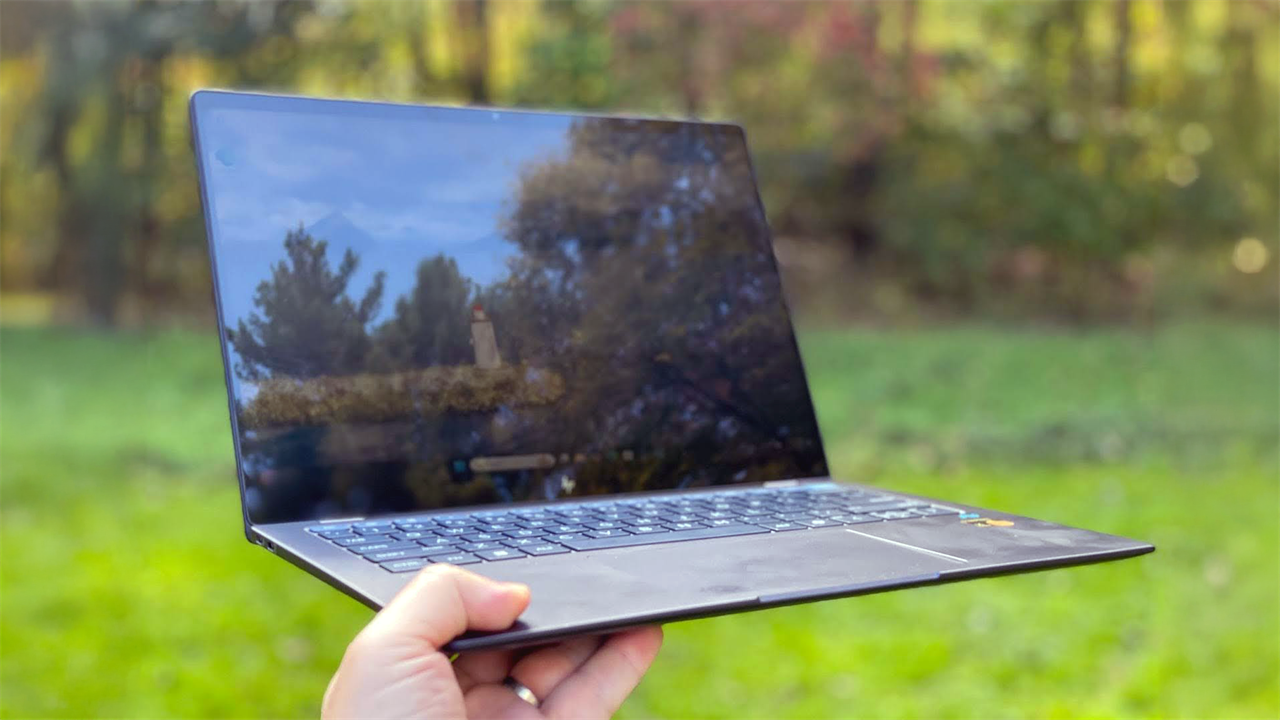
Photo: Rich Brown
The Perform function works like a relatively well-informed tech support chatbot. It can answer basic questions about your computer’s performance, and it even gives you general guidance about more technical inquiries. Asking "How do I overlock this computer," as an extreme example, gives you the basics about overclocking, but also tells you why that’s probably a bad idea for a computer like this one.
The most intriguing feature in the AI Companion is the Analyze function. Clicking it prompts you to create a library, essentially a folder you can add your own files to. Then you can ask the AI to give you an assessment of the contents of those files. I created a Portfolio library and uploaded about 12 PDFs containing examples of various articles I’ve written. I then asked it to give me feedback on the writing and it replied with a detailed (and complimentary, if I may) breakdown of my writing style, citing and notating examples from the various articles I had it read.
Since this software package is still in beta, I had some issues with follow-up questions where it asked me to try again later. But, once fully baked, you can imagine using the Analyze feature to help assess your own work or that of your colleagues, or even job candidates.
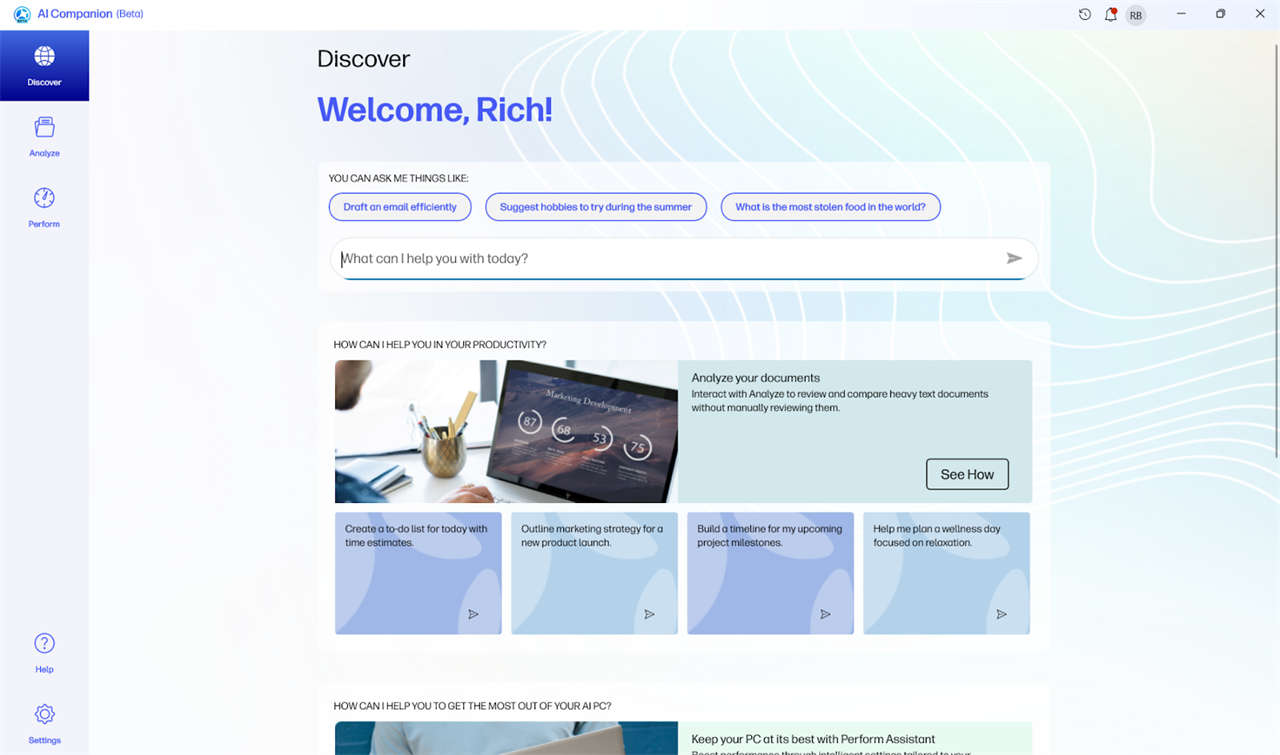
Screenshot: Rich Brown
Design and Performance
As much as HP’s new EliteBook Ultra G1q embraces AI, presumably you’d also like to tote it around and use it for the traditional array of productivity and personal computing tasks. At just under three pounds and a scant 14.4mm thick, you’ll have no problem bringing this laptop with you anywhere you’d like to take it, and the all-day battery (a benefit of the efficient Qualcomm chip inside) will indeed keep you mobile and productive whether you’re moving around between meeting rooms or trying to stay connected during a long travel day.
The design overall is lowkey professional. The aluminum and plastic construction is clean and comes in a handsome dark navy hue. The keyboard is snappy and responsive, and no more cramped than other laptop keyboards of similar size. HP has added a few custom functions to its key layout, including a key for launching Copilot, and a screenshot key that triggers a dedicated image and video-recording software widget that’s much more useful than Windows’ old PrintScreen function key/cut-and-paste combo.
For ports, you get a headphone/microphone jack, as well as a traditional SuperSpeed USB-A input, a 40Gbps USB-C port and 10Gbps USB-C port. The 5 MP camera can capture video up to 2K quality, and a barely noticeable physical shutter that closes over it gives you that peace of mind if you’re ever feeling too digitally exposed.
The EliteBook Ultra is also a capable performer thanks to its 12-core Snapdragon X Elite CPU and 16GB of RAM and a competent Qualcomm Adreno integrated graphics chip. Its overall computing test scores are strong compared with the Copilot Plus edition of Microsoft’s own Surface Laptop. I was also surprised by how well the EliteBook handled Baldur’s Gate 3 on high graphics settings. I’m sure if you pushed it you’d find the limits of this laptop’s gaming capabilities quickly, but it’s also reassuring to know that you can pass the time with this EliteBook if you’re ever stuck in the airport for a delayed flight.
Below you'll find detailed system specs and scores on our standard benchmarks.
- CPU: Qualcomm Snapdragon X Elite
- OS: Windows 11 Pro
- RAM: 16GB
- Storage: 512GB
- GPU: Qualcomm Adreno
- GeekBench 6: (Single-core): 2438
- GeekBench 6: (Multi-core): 14290
- 3D Mark Wild Life Extreme: 6255
- Price as reviewed: $1,399

Read more: AI Tools and Tips
- Getting started with LM Studio: A Beginner's Guide
- Meet Claude, the Best AI You've Never Heard of
- Hands-on with the Faster, Smarter ChatGPT-4o AI
- How to Get NVIDIA Chat with RTX: Local AI for Everyone
- Microsoft Surface Laptop Review: The First Copilot Plus PC
- What is TOPS? The AI Performance Metric Explained
A twenty year CNET veteran and founding editor of CNET Home, Rich Brown has covered everything from desktop computers to dishwashers. He now works as a consultant for early stage start-ups.



